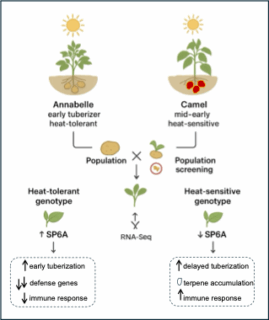Genetic link between potato heat tolerance and disease resistance
Potato yields are threatened by rising global temperatures, as heat delays or even abolishes tuber formation. We studied over 500 potato offspring from a cross between a heat-tolerant and a heat-sensitive variety to uncover the genes behind heat resilience. We found that heat-tolerant offspring formed tubers earlier and showed higher expression of SELF-PRUNING 6A (SP6A), a key tuberization gene than heat-sensitive offspring. However, heat tolerance came at a cost: these plants had weaker immune responses and produced fewer protective compounds, such as terpenes. Tests with genetically modified potato plants confirmed that high SP6A expression improves tuber formation under heat but suppresses natural defense responses. These findings reveal a genetic trade-off between heat tolerance and disease resistance, offering new insights to guide potato breeding in a warming world.
The work has been published in the Journal of Experimental Botany, September 2025 (https://doi.org/10.1093/jxb/eraf393)

